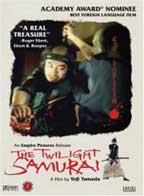
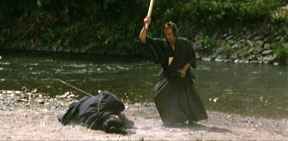 THE TWILIGHT SAMURAI
THE TWILIGHT SAMURAIAlso Known As
Tasogare Seibei
Directed by Yoji Yamada
Japan/2002 – 129 Minutes/Widescreen
DVD Provided by First Run Features
Article written by Craig Hamann
Seibei Iguchi is a low-ranked samurai who has become more of a housekeeper and parent than a warrior. His wife died of consumption, leaving him to raise two young daughters and take care of his senile mother. Because of his home predicament, his financial debt, tattered clothing and often dirty face and hands, he is ridiculed behind his back by his co-workers at a clerical part of the main castle. Fact is there isn’t much need for samurais anymore because there are little, if any, skirmishes to be fought. One day a childhood friend named Tomoe reenters his life. She has left her current husband, a drunken samurai, and is staying with her brother. But the drunken samurai finds her and creates a spectacle, behaving like the immature brute that he is. With Tomoe possibly in danger, Seibei intervenes and ends up in a duel with the enraged husband. Seibei defeats the bully and word spreads about his fighting ability. Days later, violence breaks out betweens factions and Seibei is given orders to kill a deadly samurai that seems undefeatable. He also learns that Tomoe, the love of his life, would like to marry him. What will Seibei do? Or perhaps more importantly, what will the social codes of his time allow him to do?
Filmmaker Yoji Yamada brings a fascinating historically based film in THE TWILIGHT SAMURAI to the screen. The picture won twelve Japanese Academy Awards and was even nominated for an Oscar in 2004 for Best Foreign Language Film. It deserves all the accolades. While not being a war film, the movie provides the viewer with an informative and entertaining look at the life of one particular samurai soldier. One thing that Yamada immediately makes clear is that not all samurai warriors wander the countryside engaging in battle after battle. Instead, he concentrates on Seibei’s struggles as a father, a widower, and a man of honor. Usually when one sees the word “samurai” in a title, that means there will be plenty of action, but not here. Aside from two nicely shot fights, Yamada’s film is a romantic drama and character study. Fortunately, it works on every level. The superior production competency is obvious from the get-go. This is an impressively directed and photographed project, with excellent editing, production design, art work, and musical scoring. I can’t really complain about anything in the movie. Yes, it is that good.
Based on the novel “Tasogare Seibei” by Shuuhei Fujisawa, Yamada’s screenplay carefully examines the issues of societal snobbery, including the ridiculousness of family pride taking precedent over life itself. Weaving a tale of humility and survival against a backdrop of mostly hypocritical and bull-headed society protocol, Yamada causes the viewer to not only feel Seibei’s emotional hurt but his frustration as well. Of course, it also helps that Yamada wisely employed a first rate cast. All the acting is believable, with standout work by talented Hiroyuki Sanada as Seibei and pretty Rie Miyazawa as Tomoe. Both Sanada and Miyazawa offer subtle but engaging performances as two decent people very much in love but blocked by the socioeconomic issues and codes around them. There is also a morality tale about pursuing one’s love before it is too late and how life is precious but also short. It’s great stuff and will no doubt touch most any viewer’s heart.
First Run Pictures offers a DVD with surprisingly few extras. There are two good interviews, one with writer/director Yamada and the other with lead actor Sanada, but no director’s commentary track. This film cries out for a scene-by-scene walkthrough from its director, in my view. There are also trailers for other releases. While I love the movie, I sure would like to see more from the picture quality. Presented in the original 1.85:1 aspect ratio, the transfer is disappointing. The picture is sometimes blurry and the color timing inconsistent, which is unfortunate because this is a beautifully shot film. I’m happy to say that the audio is fine, despite being available only in a 2.0 format. Still, the sound is crisp and clear, and that’s all that really matters.
Most importantly, THE TWILIGHT SAMURAI is a wonderful film. Scene after scene is loaded with breathtaking imagery and top shelf storytelling. For example, there are background scenes revealing that times are so difficult for the lower classes that dead peasant bodies, including the small ones of children, occasionally float by in the Kimo River. It’s a disturbing image and is handled in a tasteful but bluntly honest manner by Yamada. The rest of this picture contains the same kind of integrity, blending beauty with the hardness of the times. Although I’m not real happy with the transfer, the power of Yamada’s film cannot be denied. I enthusiastically recommend THE TWILIGHT SAMURAI to all genre fans.
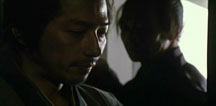 |
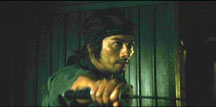 |
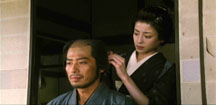 |